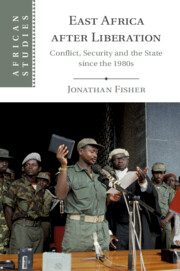Book contents
- East Africa after Liberation
- African Studies Series
- East Africa after Liberation
- Copyright page
- Dedication
- Contents
- Maps
- Acknowledgements
- Abbreviations
- Introduction
- Part I Insurgency
- Part II Liberation
- 3 From Rebels to Diplomats
- 4 Reinventing Liberation
- Part III Crisis
- Conclusion
- Bibliography
- Index
- African Studies Series
4 - Reinventing Liberation
Revolution and Regret in Congo and Sudan, 1995–2000
from Part II - Liberation
Published online by Cambridge University Press: 24 February 2020
- East Africa after Liberation
- African Studies Series
- East Africa after Liberation
- Copyright page
- Dedication
- Contents
- Maps
- Acknowledgements
- Abbreviations
- Introduction
- Part I Insurgency
- Part II Liberation
- 3 From Rebels to Diplomats
- 4 Reinventing Liberation
- Part III Crisis
- Conclusion
- Bibliography
- Index
- African Studies Series
Summary
Chapter 4 explains how an initially defensive alliance between the post-liberation elites of the region developed into a more philosophical, aspirational and militarised one, focused – putatively – around promoting regional liberation projects. The chapter demonstrates how summitry around support for the South Sudanese SPLM/A during this period provided a space for the four movements to share ideas on promoting wider regional transformation, most notably in Zaïre – a notion that spoke to their shared heritage as liberation movements and shared understanding of violence as an effective reform mechanism. The chapter cautions, however, against understanding the four elites’ involvement in the Zaïre/Congo wars as motivated by a coherent understanding of, and commitment to, regional liberation. The Horn movements’ engagement took place at a much more theoretical and superficial level than those of the Great Lakes, and elites in Addis Ababa, Asmara and Kampala took a quite different view on legitimate ways to promote liberation in Zaïre to counterparts in Kigali. The chapter also reflects, then, on the challenges encountered by post-liberation movements in reframing their country’s place in regional security frameworks, and in reimagining struggle era ideational frameworks in a new context.
Keywords
- Type
- Chapter
- Information
- East Africa after LiberationConflict, Security and the State since the 1980s, pp. 158 - 190Publisher: Cambridge University PressPrint publication year: 2020



